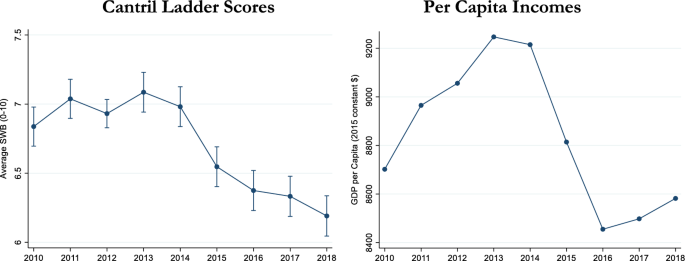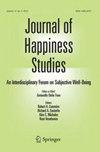经济危机、主观幸福感与选票转换:以巴西 2018 年总统选举为例
IF 3.1
2区 心理学
Q1 PSYCHOLOGY, MULTIDISCIPLINARY
引用次数: 0
摘要
本文章由计算机程序翻译,如有差异,请以英文原文为准。

Economic Crises, Subjective Well-Being, and Vote Switching: The Case of Brazil’s 2018 Presidential Election
求助全文
通过发布文献求助,成功后即可免费获取论文全文。
去求助
来源期刊

Journal of Happiness Studies
Multiple-
CiteScore
8.60
自引率
6.50%
发文量
110
期刊介绍:
The international peer-reviewed Journal of Happiness Studies is devoted to theoretical and applied advancements in all areas of well-being research. It covers topics referring to both the hedonic and eudaimonic perspectives characterizing well-being studies. The former includes the investigation of cognitive dimensions such as satisfaction with life, and positive affect and emotions. The latter includes the study of constructs and processes related to optimal psychological functioning, such as meaning and purpose in life, character strengths, personal growth, resilience, optimism, hope, and self-determination. In addition to contributions on appraisal of life-as-a-whole, the journal accepts papers investigating these topics in relation to specific domains, such as family, education, physical and mental health, and work.
The journal welcomes high-quality theoretical and empirical submissions in the fields of economics, psychology and sociology, as well as contributions from researchers in the domains of education, medicine, philosophy and other related fields.
The Journal of Happiness Studies provides a forum for three main areas in happiness research: 1) theoretical conceptualizations of well-being, happiness and the good life; 2) empirical investigation of well-being and happiness in different populations, contexts and cultures; 3) methodological advancements and development of new assessment instruments.
The journal addresses the conceptualization, operationalization and measurement of happiness and well-being dimensions, as well as the individual, socio-economic and cultural factors that may interact with them as determinants or outcomes.
Central Questions include, but are not limited to:
Conceptualization:
What meanings are denoted by terms like happiness and well-being?
How do these fit in with broader conceptions of the good life?
Operationalization and Measurement:
Which methods can be used to assess how people feel about life?
How to operationalize a new construct or an understudied dimension in the well-being domain?
What are the best measures for investigating specific well-being related constructs and dimensions?
Prevalence and causality
Do individuals belonging to different populations and cultures vary in their well-being ratings?
How does individual well-being relate to social and economic phenomena (characteristics, circumstances, behavior, events, and policies)?
What are the personal, social and economic determinants and causes of individual well-being dimensions?
Evaluation:
What are the consequences of well-being for individual development and socio-economic progress?
Are individual happiness and well-being worthwhile goals for governments and policy makers?
Does well-being represent a useful parameter to orient planning in physical and mental healthcare, and in public health?
Interdisciplinary studies:
How has the study of happiness developed within and across disciplines?
Can we link philosophical thought and empirical research?
What are the biological correlates of well-being dimensions?
 求助内容:
求助内容: 应助结果提醒方式:
应助结果提醒方式:


